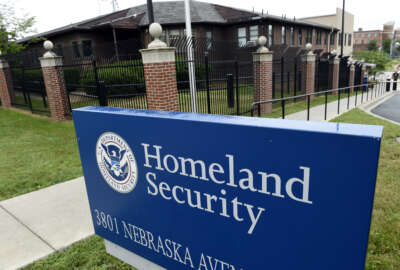
DHS funding for new headquarters slashed in FY 2017 bill
A House Appropriations subcommittee delivered a major setback to the funding of a consolidated Department of Homeland Security headquarters campus on Wednesday.
A House Appropriations subcommittee delivered a major setback to the funding of a consolidated Homeland Security Department headquarters campus on Wednesday.
The $41.1 billion DHS funding bill passed the subcommittee, but it cut $126 million in funding from the St. Elizabeths headquarters campus in Southeast Washington, D.C.
The bill also funded cybersecurity initiatives $100 million below what President Barack Obama outlined in his budget proposal for FY 2017.
Rep. Lucille Roybal-Allard (D-Calif.) said the St. E’s headquarters consolidation plan offers significant cost savings in the long-term, but only if Congress gives it the necessary funding.
“On this project, we have passed the point of no return. In fact, we have reached the phases that lead to the most savings by moving components from expensive lease spaces to the new consolidated headquarters campus,” Roybal-Allard said.
The congresswoman also called for increased funding to cybersecurity, which she said was constrained by the subcommittee’s limited power to allocate for defense function programs.
The FY 2017 spending bill for DHS awards $432 million above the President’s request and $100 million above FY 2016’s baseline funding.
The National Protection and Programs Directorate received $1.8 billion in overall funding, $120.5 million above last year’s spending. Of that, $1.1 billion funds the protection of civilian dot-gov networks and to prevent future cyber attacks.
Rep. Nita Lowey (D-N.Y.), ranking member of the House Appropriations Committee, praised the bill for fully funding the Transportation Security Administration’s workforce of more than 4,300 transportation security officers (TSOs), and for awarding $19 million above the President’s request for 50 new K-9 teams.
Lowey, however, cited the high attrition rate for TSOs as evidence for new workforce incentives.
“We can’t expect our best people to stay on the job if we continue to treat our TSOs like replaceable parts. TSOs deserve a collectively bargained contract that provides them with pay and workplace rights that will keep hardworking men and women on the job,” Lowey said.
TSA screeners currently get paid under a pay-for-performance system. Lowey co-sponsored a bill that would move those employees to the General Schedule pay scale and offer them new workplace protection.
The bill, co-sponsored by House Homeland Security Committee Ranking Member Bennie Thompson (D-Miss.), would achieve this by moving TSO to Title V of the U.S. Code.
Under the bill, the Secret Service receives $1.9 billion in overall funding, and $39 million beyond what the President requested to fund retention initiatives and address the agency’s attrition and morale problem.
The Coast Guard received $10.3 billion in overall funding, $141.4 million above the President’s request.
Rep. Hal Rogers (R-Ky.), chairman of the House Appropriations Committee, rebuked DHS on its failure to hire new personnel at a number of key agencies — including TSA, Customs and Border Protection and the Secret Service — despite providing the money to do so.
Rogers said the problem speaks to the initial challenge of forming DHS in 2002 from many dissimilar agencies.
“It’s almost impossible to merge this many agencies with separate missions into a workable unit. And we provide money for much-needed personnel requirements, and the department fails to follow through with hiring adequate people. Don’t tell me there’s not adequate labor out there —there is,” Rogers said. “These agencies, now part of a much larger department, sometimes can get by with sort of hiding in the weeds, being swallowed up by this huge Department of Homeland Security, thinking that we won’t notice that they’ve not fulfilled their mission. Well we’re noticing, and they need to get with it.”
Rep. Henry Cuellar (D-Texas) proposed crafting an amendment for the full committee markup that would make management at CBP accountable for hiring the new workers it promised.
“The worst thing they can do is they can say, ‘Well, Congress didn’t give us the money.’ We’ve been giving them the money over and over and over again,'” Cuellar said. “While we’re waiting for them to hire folks, we’re still seeing delays at the border, and this doesn’t include only the people that we gave them money for, but there’s attrition rates.”
In fiscal 2014, CBP received funding to hire 2,000 additional officers, but Cuellar said the U.S.-Mexico border remains understaffed.
Copyright © 2025 Federal News Network. All rights reserved. This website is not intended for users located within the European Economic Area.
Jory Heckman is a reporter at Federal News Network covering U.S. Postal Service, IRS, big data and technology issues.
Follow @jheckmanWFED




